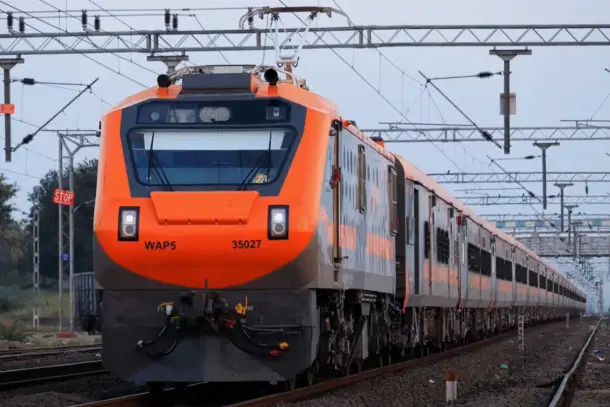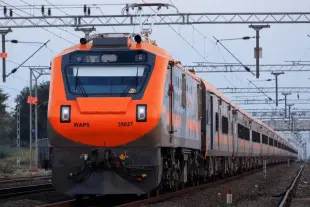Infrastructure
'Kavach' Going International: RailTel MoU Paves Way For Safety Push In India And Beyond
V Bhagya Subhashini
May 02, 2024, 03:48 PM | Updated 03:48 PM IST
Save & read from anywhere!
Bookmark stories for easy access on any device or the Swarajya app.


In a significant move towards enhancing railway safety, the Indian Railways has forged an agreement aimed at exploring and executing train collision avoidance system projects, known as Kavach, not only within India but also internationally.
The Memorandum of Understanding (MoU) was formalised between RailTel Corporation of India Limited and Quadrant Future Tek Limited, signifying a strategic collaboration to delve into the implementation of Kavach projects in India and beyond.
Highlighting the significance of the agreement, RailTel emphasised that KAVACH's implementation holds a place of priority within the Indian Railways' agenda, having been designated as the "National Automatic Train Protection (ATP) System" by the Ministry of Railways in July 2020.
Quadrant Future Tek Limited, undergoing final approval processes as an original equipment manufacturer (OEM) for the KAVACH project by the Research Design and Standards Organisation (RDSO), brings its technological expertise to the partnership.
Sanjai Kumar, chairman-cum-managing director of RailTel, affirmed the organisation's dedication to supporting Indian Railways in implementing indigenous safety systems like KAVACH, while also expressing a keen interest in proliferating the technology globally, reports Economic Times.
Quadrant Future Tek Limited, recognised for its technological innovation and adherence to quality management systems, is poised to contribute significantly to the successful execution of the Kavach project alongside RailTel.
What is Kavach?
Kavach was developed by the Research Design and Standards Organisation (RDSO) under Indian Railways in collaboration with three Indian vendors — Medha Servo Drives Pvt Ltd, HBL Power Systems Ltd, and Kernex Microsystems.
Since 2016, the Indian Railways has been carrying out field tests for Kavach on passenger trains, with further operational improvements in the works.
As part of the new system, railway tracks, signalling systems on railway tracks, and the engines of trains are installed with radio frequency devices (without relying on a central server) that continuously send signals back and forth on a real-time basis to indicate that the track on which the train is operating has no obstacles.
This system effectively controls the train's speed and automatically applies brakes when required, particularly in situations where the loco pilot may not be able to do so. Similar safety systems are followed in other countries.
Railway tracks will be equipped with pressure sensors capable of detecting weights exceeding 500 kg. These sensors will then transmit signals to the train's engine, prompting the automatic application of brakes. Obstacles that are up to 10 km ahead will be detected by devices installed on railway tracks.
The features include transmitting line-side signals to the train cab, which is beneficial in high-speed and foggy conditions.
As per a report on the progress of Kavach, so far 1,659 km of railway line has been covered and an additional 500 km will be covered by March this year. In the next three years, at least 5,000 km will be covered.
V Bhagya Subhashini is a staff writer at Swarajya. She tracks infrastructure developments.





